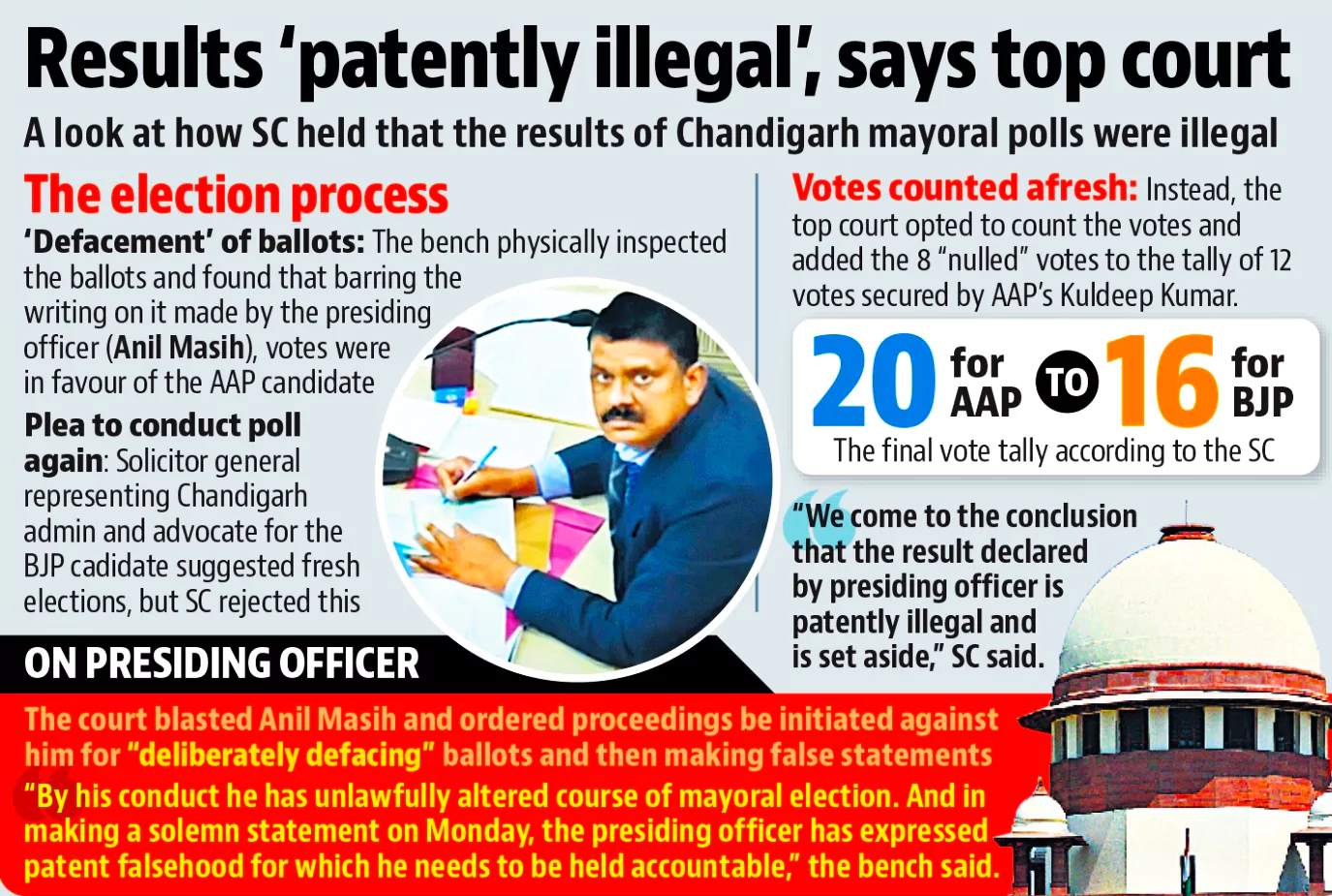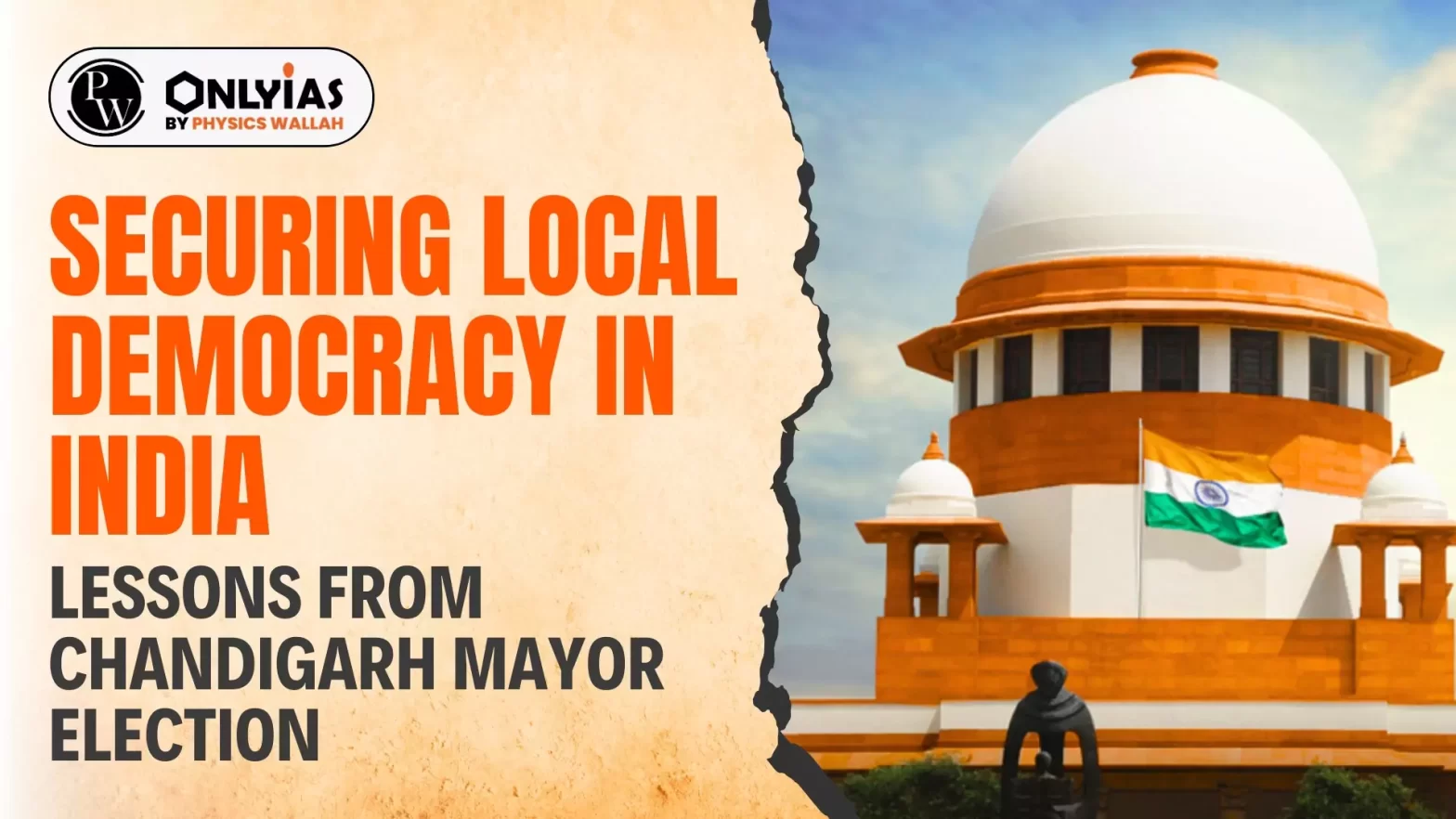Context:
This editorial is based on the news “Safeguarding Local Democracy” which was published in the Hindu. The Supreme Court has nullified the outcome of the mayor election held in Chandigarh recently under Article 142 of Constitution.
Chandigarh Mayor Election: Background

Supreme Court’s Intervention in Chandigarh Mayor Election:
- The three-judge bench, led by Chief Justice D.Y. Chandrachud, used Article 142 powers to declare AAP candidate Kuldeep Kumar as validly elected Mayor.
- With CCTV visuals indicating that the presiding officer had defaced some ballot papers in the mayoral polls, the Supreme Court conducted a physical examination of the ballots to determine the winner.
- Three AAP councillors joined BJP just before the Supreme Court’s verdict.
- BJP won deputy and senior deputy Mayor elections on gaining a majority in the council.
Issues Within Local Democracy in India
-
Administering Local Elections:
-
- Indirect Mayor Elections Process: Local government elections are overseen by State Election Commissions and governed by the Punjab Municipal Corporation Act 1976 in Chandigarh involving an internal process.
- As per Section 60 of the Punjab Municipal Corporation Act 1976, the meeting for the election of the Mayor shall be convened by the Divisional Commissioner, who nominates a councillor, who is not a candidate for the election, to preside over the meeting.
-
- Problem arises as municipal law allows bureaucratic appointment of any councillor for presiding over mayoral elections.
- In the 2022 Chandigarh mayor elections, accordingly, Anil Masih was nominated as the presiding officer for the meeting to elect the Mayor.
-
- In case of defections in local governments, the scope for the court’s intervention is limited since the anti-defection law under the 10th Schedule of the Constitution does not apply to panchayats and municipalities..
- States such as Kerala and Karnataka have passed specific laws prohibiting defection in local elections. In most states there are no clear statutory restrictions against defections.
-
Challenge of ensuring democratic governance in Union Territories (UTs):
- The Central government’s attempts to control elected bodies in UTs. There are two types of Union Territories (UTs):
- Union Territories with Legislature: Delhi, Jammu and Kashmir, Puducherry
- Union Territories without Legislature: Andaman and Nicobar, Chandigarh, Dadra and Nagar Haveli and Daman and Diu, Ladakh, Lakshadweep
- In UTs with legislative assemblies, like Delhi and Puducherry, the Centre seeks to empower the Lieutenant Governor over the elected government.
- In UTs without legislative Assemblies, like Lakshadweep, the Centre-appointed administrator introduced sweeping legislative measures that locals have objected to.
- There is a need for providing more powers and empowerment to union territories without legislative assemblies.
-
Play of Political Parties:
- While political parties were initially envisioned to play a non-dominant role in local elections, the party-political nature of local governments is now a reality that cannot be ignored. Hence, there is a need to adopt clear statutory measures that can curb defections at the local level.
Conclusion:
There is a need to apply federalism and democracy principles to Union Territories and local governments to counter centralization of power and encourage participative democracy.
Also Read: RBI Report On Panchayati Raj Finance
| Prelims PYQ (2019):
With reference to the Constitution of India, prohibition or limitations or provisions contained in ordinary laws cannot act as prohibitions or limitations on the constitutional powers under Article 142. It could mean which one of the following?
(a) The decisions taken by the Election Commission of India while discharging its duties cannot be challenged in any court of law.
(b) The Supreme Court of India is not constrained in the exercise of its powers by laws made by the Parliament.
(c) In the event of grave financial crisis in the country, the President of India can declare Financial Emergency without the counsel from the Cabinet.
(d) State Legislatures cannot make laws on certain matters without the concurrence of Union Legislature
Ans: (b) |
![]() 7 Mar 2024
7 Mar 2024

